|
[ May 2010 ] | |
|
| |
|
|







|
|
TCHS 4O 2000 [4o's nonsense] alvinny [2] - csq - edchong jenming - joseph - law meepok - mingqi - pea pengkian [2] - qwergopot - woof xinghao - zhengyu HCJC 01S60 [understated sixzero] andy - edwin - jack jiaqi - peter - rex serena SAF 21SA khenghui - jiaming - jinrui [2] ritchie - vicknesh - zhenhao Others Lwei [2] - shaowei - website links - Alien Loves Predator BloggerSG Cute Overload! Cyanide and Happiness Daily Bunny Hamleto Hattrick Magic: The Gathering The Onion The Order of the Stick Perry Bible Fellowship PvP Online Soccernet Sluggy Freelance The Students' Sketchpad Talk Rock Talking Cock.com Tom the Dancing Bug Wikipedia Wulffmorgenthaler |
|
bert's blog v1.21 Powered by glolg Programmed with Perl 5.6.1 on Apache/1.3.27 (Red Hat Linux) best viewed at 1024 x 768 resolution on Internet Explorer 6.0+ or Mozilla Firefox 1.5+ today's page views: 407 (36 mobile) all-time page views: 3401126 most viewed entry: 18739 views most commented entry: 14 comments number of entries: 1228 page created Sun Jul 13, 2025 20:26:54 |
|
- tagcloud - academics [70] art [8] changelog [49] current events [36] cute stuff [12] gaming [11] music [8] outings [16] philosophy [10] poetry [4] programming [15] rants [5] reviews [8] sport [37] travel [19] work [3] miscellaneous [75] |
|
- category tags - academics art changelog current events cute stuff gaming miscellaneous music outings philosophy poetry programming rants reviews sport travel work tags in total: 386 |

| ||
|
We have great wealth, it is everywhere, and Costa Ricans have been looking after it for the past 40 years. Our wealth is green, represented by 4.5 per cent of the biodiversity known to date; all in a territory which constitutes only 0.03 per cent of the world." - the Ambassador of Costa Rica responds to our MM. I would call it a draw - Costa Rica might indeed be rich, but it is also true that not many wars have been started over beetles, despite their standing with the Creator Curse the infernal heat! (link credit edchong)... bearing with it... In-Camp Training cancelled, freeing up two weeks. Two Down, 32 to go 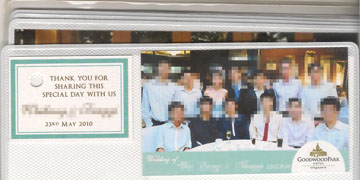 Table Ten Sunday saw the bachelor count of 4O go down by one more, in an evening that saw smk (whose liver has probably levelled up after long bouts of entertaining Chinese visitors in an official capacity) plying csq with wine, which might have contributed to a S$38 cab fare home due to consequences that were not entirely improbable; there might be a few more in the pipeline, with one engagement announced right after the dinner. The wedding was also notable for being graced by edsoon, a bona fide 如謎一般的男人. By the time we left, we were no closer to finding out what he was working as, much less other more intimate information. Come to think of it, he might even be married, for all I know. N.B. It was also the first time I visited the Goodwood Park Hotel, many years after I first read about it in the Sultan of Brunei's biography. Mental image was completely unlike reality. Saint Petersburg Wednesday night was spent at Minds Cafe, and after a round of Container (which I had unfortunately forgotten the strategy for), we were introduced to a game called Saint Petersburg. As board games go, it wasn't too complicated. There are four decks of cards - the Worker deck, the Building deck, the Aristocrat deck and the Upgrade deck. Each players starts with 25 roubles, and a marker corresponding to one of the decks (randomly picked). Each round then consists of four phases corresponding to each deck, and during each phase the player with the appropriate token goes first. At the beginning of each phase, cards are drawn from the corresponding deck until there are eight cards on the table (therefore, eight workers are always drawn at the very first phase - note that these numbers are for a four-player game). Then, each player may take an action - which is usually to either buy a card outright (paying the cost in roubles), or to hoard a card for future use (which does not require roubles, but the card's production does not occur, and only up to three cards may be hoarded at any time).  A Worker, a Building, an Aristocrat and an Upgrade walk into a bar... The phase ends when all players pass (this might be voluntary, but must eventually happen), and then the production of all the appropriate cards each player owns take effect. Generally:
While the rules are simple to grasp, playing well is another matter altogether. While, unlike Container, it is not possible to go into debt, overextending early on can seriously cripple a player. A common beginners' mistake would be to buy the first huge building that comes along (hey, it produces 5 VPs a round, can't be bad, right?), and end up not having money to buy new workers in the second round, and then possibly the third, which would put him in a hopeless position. A rather less intuitive component of strategy is the manipulation of the board - recall that there are at most eight cards available at any time. Therefore, if five cards remain after the last phase of the first round, just three workers will be drawn at the beginning of the second round, and guess who loses out? In such a situation, it behooves that player to hoard something, if only to get a vital third worker. Happily, there is a freeware version of the game [about 2.2MB, including English language pack], which frankly is quite challenging - my win percentage is only beginning to inch towards 40%. Games certainly don't have to have explosions everywhere to command attention. Discussion on Debt 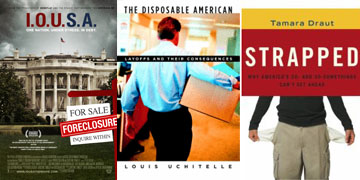 The New American Trilogy However painful debt may be in games, it's worse in real life. America in particular has an issue with it, and I.O.U.S.A, a critically acclaimed movie in book format, more or less beats one simple message into the reader's head: The USA has been spending more than it is producing for a long time, and something has to give. How bad is it? As of today, U.S. public debt is around 70% of GDP (i.e. roughly what the country produces in a year), or in other words, the entire U.S. would have to give up all their output for eight months to repay it. From another perspective, that's US$30000 for every single person in the USA; the consolation is that the USA has recovered from a debt level of some 120% of GDP, but that was directly after the Second World War. Debt by itself is not undesirable - borrowing to invest for future returns can be worthwhile, even necessary. The problem is that this does not appear to be the case with the USA, and the debt simply snowballs to future generations, i.e. people who are not yet born become liable for the debts of their forebears. If this continues, lenders will at some point doubt the ability of the country to repay its debts... and that's when the trouble starts. Barring a miracle, what happens then is that the citizens will have to endure some combination of working harder and consuming less, as more taxes are collected to pay back the debts, while the country's assets fall into the hands of foreigners (this was a concern with the Japanese at the height of their prosperity in the Eighties). That's playing nice; alternatively, citizens might decide they've had enough and emigrate, the government could just print more money, or even just default and refuse to honour the debts. This has in fact happened many times before without the sky falling, but those were small fishes compared to the USA. But are things that hopeless? Buffett says no, since productivity is continually rising, and standards of living will improve despite the debt burden on future generations. Other like Ron Paul are not so optimistic, and blame the conversion of the U.S. dollar to a fiat currency (which freed it from being backed by gold, and essentially meant that the government could create money at will); this probably works with sufficient discipline, but several interviewees point out that politicians are too often tempted to take more than they give, if only to be re-elected. William Bonner also points out that gold mining yields have tended to increase by about 2-3% a year, closely matching world aggregate GDP growth, which makes basing currencies on it very appropriate. It is also pointed out that Greenspan was on record as a fervent advocate of the gold standard in his youth, but did an about-turn once he was in control at the Federal Reserve. Dr. Greenspan has his say too, but his piece appears me to mostly be stating that people have the right to be fiscally irresponsible in a free society, and that there is not much the Fed can do to fix a low savings rate. 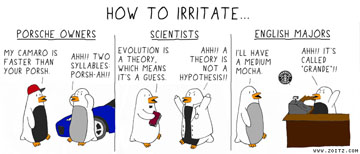 With apologies to English majors - it's just allegory! (Source: zoitz.com) The other two books may lend some insight into the low-savings problem. Strapped contends that young adults can't save because they are often deep in debt (US$20000 on graduation from college, US$45000 after graduate school, and a whopping US$100000 for newly-minted lawyers and doctors was cited). Oh, credit card debt after some freebies and drinks during promotions on campus play a part, but it's minor compared to the cost of higher education. But, but - education is an investment, in fact perhaps the most exalted form of investment, right? True. But even so, going into debt to fund an education has an associated fallout. If a young adult wishes to buy a home and start a family, finances can get very tight, especially with a chunk of his paycheck being used to repay his loans. And any emergencies - baby falls sick, car broke down - might well require additional borrowing, and let's just say that credit card companies are not very nice, as far as leeching onto the desperate is concerned... [N.B. See this and this and this] All this might yet be alright, if young adults had job security - if one is assured of a salary that steadily increases throughout one's working life, then taking out loans for education to get that stable job is wise. Unfortunately, there are two problems. The first is that, while a bachelor's degree is necessary for entering the middle class, it is far from sufficient; as the author puts it, a bachelor's degree is the new high school diploma, with graduate degrees the new bachelors. Therefore, most young adults without parental funding (or a cushy family business) have little alternative but to borrow to pay for college, if they desire to get anywhere in life. The second is that jobs, or more specifically well-paying and stable jobs, are becoming harder to find. As The Disposable American puts it, not too long ago, laying off employees was seen as a sign of failure, and blue-collar workers could aspire to a standard of living similar to most white-collar workers. Well, it's the same old story - when the knockoffs from China become nearly indistinguishable from your products and sell for far less, something has to give, and it's often jobs. Three cheers for the New Economy. [N.B. One side bonus of library books is the loan slips (and sometimes namecards) that are used as bookmarks and then left within. Guessing at the motivations of past readers can be a refreshing diversion] Personal Productivity  The Alternative Desktop Felt that I needed a little something to jumpstart myself, and a trip down to Daiso at IMM yielded three corkboards, a hundred pins and a sturdy mesh basket, at S$2 each [N.B. Daiso is run on essentially the same idea as the now-defunct One.99 chain of stores] Some things are just better in hardcopy than on the computer screen, and with this my to-do list will never be off. Made a trip down to the city area to collect some stuff, and got some mounting tape (not exactly cheap) to attach the boards. Took a short walk round Carrefour, and discovered that their house brand tennis rackets sold for just S$15. If only I had known. Widescreen DotA Today's tech tip is on how to play DotA (a Warcraft III mod) in its proper proportion on a widescreen monitor. Warcraft III is an ancient game by today's standards (being released in mid-2002), and as such does not have native widescreen support, unlike some newer games; being able to view more of the map at one go appears to be regarded as cheating. My Samsung naturally stretches the image to cover the full display area, which I felt was less than pleasing, with everything looking squashed - this however is a matter of taste, and there are queries on how to do this, on monitors that display black vertical bars (which I wanted) instead. In the end, i used the -window -opengl options to run WC3 in windowed mode, and the Sizer freeware to set the window size to the desired 1440 x 1080 in one click. Finally, to prevent the mouse pointer from moving out of the window, Windows Mouse Capture can be used.
- as seen on FARK (which is not quite what we think of it, no sirree!) It must be said that "made in China" is not the death knell for a product; for example, the RaZer DeathAdder I splurged on has been holding up nicely, and if it maintains its performance for a few years I'll be sold on the concept of spending more to spend less. Let's see what I have stored: disposable males and princess upkeep, abandoned hamsters (think Mr. Ham saved this one) and a history of heaven, and the Riverworld. Eclectic! Mr. Ham In 3D  If you don't have the glasses, squint and make the best of it 3D seems to be all the rage nowadays, not that everyone likes it, but it was inevitable once Avatar made the megabucks. Tron in 3D, Shrek in 3D, and advertisements in the local newspapers in 3D. Well, if you'd like to try your hand at it, there's the StereoPhoto Maker freeware to play around with, as Mr. Ham found out to his delight. CRFs And The Market Had a seminar on conditional random fields (CRFs) this Thursday, which is more or less a generalisation of hidden Markov models, for those interested in these things. Tellingly, most of the questions were asked on its usage in stock market prediction than any other application, though (as usual) it doesn't promise too much in that respect; the professor doing the presentation readily revealed that most big investors don't rely much on such technical analysis, which Buffett famously derided by noting that it gave the same answers whether the charts were right side up or upside down (but this is probably hyperbole) Technical analysis for dummies: It states that the price of a stock (and its movements) is the most, and some even say only, important indicator of how the price will change in the near future, or cut to the bone, the best predictor of how a stock will do tomorrow is how it did today (Markov assumption, anyone?)  And a tenth of the wealth of a nation... just vanished (Source: usfst.com) The trouble is parlaying this into actual profit, which is complicated by the transaction costs, which means that an investor generally needs to do rather better than 50% to earn anything - it is oft stated that even 51% is good enough to make a load, but guaranteeing a minimum return in the short term is easier said than done. This is especially if the programs written to take advantage of such analysis inadvertently enter a death spiral through positive feedback, which some suspect caused the Dow to crash, wiping out nearly 10% of its value in minutes. Aside one: A study suggested that testosterone predicts trading profits. In this case, might some doping make sense in the industry? Surely it wouldn't get the bad rap it gets in sports... Aside two: But 51% or more is possible - if you're a big boy. While accusations of rigging the market might be pushing it a bit, since a better comparism for large investment banks might be with casino owners or bookmakers who take a fixed cut rather than some small-time shyster that loads the dice (which by the way can be used to demonstrate CRFs), it's not as if the banks are completely in the clear. Quote: "...Goldman Sachs stands accused, in part, of giving favored financial treatment to Paulson's firm, allowing him to advise on the creation of a security, Abacus, that he wanted to fail; Goldman later sold it to investors who wanted the security to succeed, but didn't tell them Paulson had played a role in creating the thing and shorted it to bet it would fail... Goldman apparently withheld information about Paulson's involvement from the buyers... who lost about $1 billion on the deal." The moral of the story is that if one is big enough to play both sides, and has few enough morals, it would be hard not to make money. Aside three: Unsurprisingly, the financial sector came out as least popular in some survey, while technology came out tops, which I found amusing since I have qualifications in both fields. The problem with finance, or actually, technical analysis and pure speculation, is that it doesn't produce anything. Still, capitalism is probably the best that mankind has so far. NUS Flyover 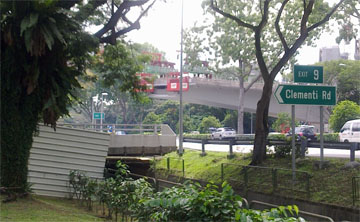 Coming together in mid-air... I've never been much of a photography buff, but I've always appreciated construction (and the act of creation in general), and so I couldn't resist taking a shot of the half-built flyover at NUS. It turns out that there's a closer view available at STOMP - too bad it comes under the heading of "Incomplete flyer at AYE could collapse and smash cars to pieces". Places Revisited Occasionally, I happen to read about places I've been, though it would be hard to miss the chaos going on in Bangkok recently. Not that protests are that rare in Thailand - the yellow shirt faction blockaded airports a couple of years ago, for example - but this time it ended in fire. The CentralWorld mall, which I enjoyed just last December, has been more or less razed. What a pity. I suppose they could rebuild it better than before; the Thais have my sympathy as they are a very nice and polite bunch as a whole from my experience, and the taste of some green-colored drink they had in their army camps suddenly floods back into my consciousness. Now where did that come from? The Mafia Wars game on Facebook quickly put out missions that appear to closely mirror actual events (but are no doubt coincidences), which might be held to be in slightly bad taste, especially if they had more players from Thailand. Case in point: A U.S. Marine sub-boss is no longer found in the game. They were nothing short of prescient in releasing their Paris arc that involved stealing the Mona Lisa, however - a few days after the conclusion, five paintings were indeed taken from the Musee d'Art Moderne. And Naples. "Pizza in Naples cooked with wood from coffins" says it all. Thankfully we ate pizza at a rather high-end restaurant last year. I think. Breaking for the Champions League final...
- Lucifer Morningstar "...But first, what is the definition of 'above'?" - A modern theorist Basketball cancelled for want of participants, so this gives me some time to blog... ...in Numberless Dimensions 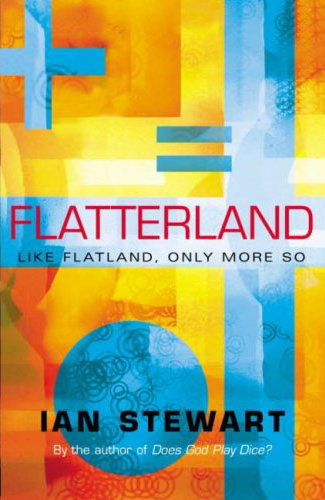 Next: Flattestland? (Source: ianstewart.joat) Flatland is one of the few mathy texts that has found enduring favour with the general public, and has been constantly in print since 1884; it therefore takes an author with some gumption to attempt a sequel, which is what we have with Flatterland. As with the original, it mixes social satire with mathematics, though the eyes of the granddaughter of the original narrator A(lbert) Square - Victoria Line. It also clears up one of the lingering issues of Flatland, which is the observation that if male children consistently have one more edge than their father, the world would be filled with near-Circles in short order. Flatterland fixes this by stating that such improvements evolve at a pace far closer to that of the real world, and that an extra edge (or even the loss of an edge) happens very rarely indeed. Thus, most Flatland males are of the same order as their parent. With that out of the way, the book covers the Kepler Conjecture (probably solved, with heavy computer number-crunching), the ubiquity of dimensions (strictly speaking, any value that cannot be expressed as another value is of a different dimension, so things actually have a far more dimensions than we usually think they have), fractals with non-integer dimensions (tangentially related to research I may be doing), the construction (and undecidability) of the Mandelbrot set using a (Stanford-educated?) cab-driver analogy... ...Topology with teapots and two-holed doughnuts being equivalent (cup-to-doughnut animation), one-sided Möbius strips and Klein bottles in the form of a cow, the projective plane, the close relationship between finite geometry and combinations, the classification of geometries by allowable transformations (which leads our heroine V. Line to posit that it is not the number of sides, but the number of symmetries that should matter, kickstarting Flatland feminism in the process) and hyperbolic geometry... ...and then delves into physics with Schrödinger's cat, wave-particle duality, quantum systems, special relativity and the twin paradox, spacetime and Feynmann diagrams, wormholes and the shape of the universe... ...which is quite a handful for a paperback. Worth a read, especially if you liked Flatland. Changes They happen, what with both Google and Wikipedia implementing interface updates. And as it was with the new monitor (and Facebook), I guiltily found that I got used to it much faster than I would have thought. Humans are adaptive creatures, after all. And so it is with the venerable Grilled Birds website:  After eight long years You know that you have a problem when the first thing that comes into mind when building a website is not "let's customize a ready-made content management system", but "hey, let's just write everything!", but after so long, I discovered that it might be faster to just code up one's own simple forum software, for instance, than modify an existing one. For the curious, the whole shebang took about a week in all (more trivia: the site is 4000+ lines of Perl code, and 2+MB of database data), and it's a load off my back; I'll probably get around to rewriting my blog software after I get my first serious publication. The site did mark a milestone - it's my first production piece that actually uses mySQL, since my first projects hailed from the bad old days when web hosts didn't have that option, but did allow writing to plain text files; not having to worry about delimiters and whatnot turned out to be helpful, as were cross-table queries that might have otherwise proven clumsy. Notably, the site is also centered on screen, a convention that I should have followed with this blog, but instead got lazy with the not-quite-so-silver bullet of absolute CSS positioning. Next time, then. Didn't discover a good way to align stuff both to the top and to the bottom in a table cell, and ended up using way more tables than divs than I intended to (I was trying to migrate from the dark days of late-1990s HTML) and not quite meeting validation standards; however, the site works fine on both major browsers and Chrome, and that's good enough for me. Fitness Those with longish memories might recall my not-a-resolution in January, and I am happy to announce the results:  Note: only the start and end points for January-April are accurate; weight loss was certainly not linear The story goes like this: I was enthusiastic enough for the whole of January up through the first week of February, at which time my grandma began to get concerned about my sometimes-45 minute jaunts on the elliptical machine (and of course if I sit on my butt, she has to have a word too...). Not much appeared to be happening despite compulsive weighing, and I took a fortnight off before getting back into it for the remainder of February and about the whole of March. I only got on the elliptical once for April, but by then my weight had automagically dropped from 71kg to about 65kg, which was my goal to begin with. I expected a rebound of sorts as I weaned off my eat-less routine and began consuming the odd night snack for the examination period, but surprisingly nothing much happened, as my weight settled around 66kg despite almost two months of doing very little. I suppose it simply isn't that complicated at all - eat less, exercise more, and keep at it for a bit. And what from here? Losing more weight is a no-go, as that path leads to skeletonization. I'll keep my next fitness target under wraps for now, then. On a related note, I should perhaps try to sleep earlier - however, the almost-guaranteed strange dreams that I get by retiring in the early morning are almost worth it for themselves; I would surely not have had the imagination otherwise to recreate them. The not-a-resolution-about-attitude thing is a work in progress, but if nothing I (re-)discovered that I can do a lot of s**t if I put my mind to it. Nothing new then. Still, I sometimes wonder unworthily what life might be like if I loved (say) money exclusively (not that I have no love for it at all) - might things be far simpler, and life easier to endure? FS Error And finally, a tribute to one of the stupidest programming errors... where one attempts to press Alt-F-S to save the file, but ends up typing "fs", unchecked, into the code on the first failed attempt. Unsurprisingly, there is then a fatal error, which is made worse when the platform is not configured to return error messages (i.e. Perl on the web), nor write them to a log.
- academics - Fair's fair since the stipend continues even when school's out, and I seriously should be looking to get published real soon, lest I get stuck in academic no-man's-land. With that in view, I sat in on a seminar on paper-writing today. But first, the news while it's fresh: PSLE 2+1? On the subject of mother tongue at the PSLE level, the suggestion for a two-choose-one formula, where students can pick between their mother tongue or science to count towards their aggregate score, was mooted in the local papers. Quick: is this an everybody-wins scenario? I would say no, as this would now benefit "specialists" more than "generalists", with the kids who are able to juggle more types of studies disadvantaged compared to those who can handle fewer (but possibly do better in those). There might be less dissent, however, as not many self-identify with these groups (unlike the English-vs-Chinese-educated divide), and for the students themselves, I can't see how essentially dropping a quarter of their workload is going to be unpopular with them. Die Die Also Die The next major item of interest in the local news would be the Law Minister's remarks on the death penalty. Here, I quote the first paragraph of Today: "The mandatory death penalty for serious drug offences here is a 'trade-off' the Government makes to protect 'thousands of lives' that may be ruined if drugs were freely available." The minister reasoned that safety and security comes as a trade-off with "this framework of the law", which I believe to refer to the death penalty, and that this trade-off is not always apparent. Quote: "You save one life here, but 10 other lives will be gone. What will your choice be?". He continues by arguing that if young traffickers such as Yong Vui Kong were spared, drug barons would respond by sending more such people with sob stories, i.e. abused adolescents or weeping mothers, and that there would be "a whole unstoppable stream of such people coming through". Here, I assume that Today has accurately reported the minister's words and intentions, a liberty that I enjoy only thanks to the government's history of diligent prosecution of any publication that would irresponsibly misrepresent them, through due process of the law. With that settled, one might then respectfully point out the fact that the choice is not between killing traffickers or setting them free, but that alternatives such as life imprisonment are available. For the sake of this discussion, let us pretend that the penalty has been changed to, say, a mandatory minimum of thirty years, perhaps with caning, which itself is no joke. 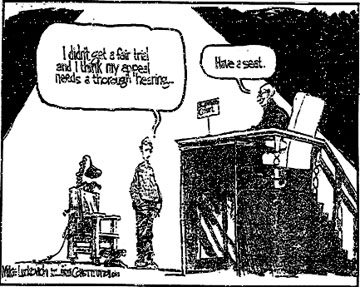 No noose is not necessarily good news (Source: filipspagnoli) The question then is: Would being locked up for at least thirty years prove less of a deterrent than death, and if so, how much less of a deterrent would it be? (Since either punishment would protect the public from the risk of the criminal reoffending, this factor should not come under consideration) This is a classic debate issue, not the least since statistics on its effects have been inconclusive (refer also to an academic paper, interestingly written by a mathematics professor). One might then think that, if we are unsure of the deterrence effect, shouldn't we err on the side of (relative) mercy, as capital punishment will inevitably be applied to innocent victims, if it exists? Apparently no, at least here. There is a clear difference between capital punishment and life imprisonment in at least one respect, though; for capital punishment, the cost is but a length of rope, which is generously supplied by the state (don't knock it, they make the guy's family pay for the bullet in some other places). If you lock up a guy, in contrast, the state has to pay for his food, lodgings, medical care, etc - and this does not come cheap, contrary to expectations. For the USA, the cost is over a hundred bucks per prisoner per day, and I'm not sure if it costs much less in Singapore (give me a moment here to get over the fact that prisoners collect more benefits than graduate students...) [N.B. it appears the cost argument may not apply in the USA (see paper before), but if this is true in Singapore too, there should be even less call for the death penalty] Then, the second question is, if life imprisonment were implemented instead, who pays? Easy enough - the state, and therefore the public. Would the general public be willing to pay higher taxes to support criminals who, despite possible mitigating circumstances, sought to damage their society? I do not know. One way to look at it is that far better people have and will continue to die for far worse reasons, and if funds are available, there are certainly far more deserving citizens to spend it on (an area in which the government has been very prudent, but which given the debt crises in Europe, perhaps been wise). However, while I am all for tough justice, long decades of incarceration is tough enough for me. A related third question is that, if deterrence and social repercussions are key considerations, why does 30g of cocaine carry an automatic death sentence, while wilfully driving while drunk, for instance, results in a jail term of just six months? Readers are invited to mull over this and comment. Power Papers Finally on to the seminar (link to presentation), chaired by my pattern recognition professor from last semester. Other than the small matter of it stretching to two hours instead of the scheduled one, it was really quite pleasurable. If there is one thing that researchers in any field have to do, it is write, and it is undeniable that good writing helps, or more pointedly, bad writing hinders the chances of a researcher getting published, quality and content of the work aside (by the way, this was mentioned by Wenhoo of the Hidden Blog Which May Not Be Linked) - the prof revealed examples of praise received from reviewers on the language used, although sadly enough those papers were still rejected. At this point, having seen in my time a few papers which could stand to be tidied up heavily, I have to comment that having a poor mastery of the English language is one thing, but obvious spelling errors is another - when mistakes which could have been corrected by Microsoft Word, or heck, even OpenOffice Writer for the penniless, remain in a submitted paper, I can only imagine how well-disposed the reviewers will be towards it. Perhaps somebody should popularize a TeX editor with spellcheck built in. That and basic grammatical errors aside, one wonders if researchers might consider hiring English majors and grad students to tidy up their writing - it looks like pure win-win to me, given that funding for the arts is usually not as easy to come by, it might well make the difference between getting published or not for the scholar in the sciences, and I can't see this as cheating by any means. I know what I would do if I had to publish in French, or maybe even Chinese. Another little gripe on one of the main functions of a paper being to allow others to reproduce the results - I would much prefer some code uploaded to the Internet in almost all cases, and thankfully this seems to be pretty widespread in CS, if not quite common enough yet. An exercise on identifying the good and bad aspects of two introductory passages followed, with one of them being a wholly negative example, complete with Random Capitalization™ (however, you can get away with Small Details like that, and alternatte spelings, if you're Chaucer). Next up was on choosing a title, and in this respect it seems that the research community is getting cooler than I ever expected it to get, with papers entitled "Six in the City", "Smile, you're on identity camera", "An eye for an eye" and the winner, "Finding Naked People", cited no less than 285 times, despite being by no means very accurate, which might indicate that inexplicably getting lucky with the correct subfield is as important as a witty title. Who would have thought? [N.B. Just for interest, Google SafeSearch works not by analysing the images themselves, but the text (and other) content of the pages that the images are on, to the best of my knowledge. Or perhaps Google have perfected the naked people algorithm; they have certainly succeeded in turning me into a Google Conduit whenever somebody asks for my help on a technical matter] As is my habit, I will end off by deliberately plagiarizing one of the speaker's best moments, in which the amazing capacity for English to compress information is demonstrated. It involves a rookie reporter who is given the task of covering a crime story, where an inmate escapes from a mental asylum, chances upon a woman hanging clothes out to dry, rapes her and steals some of the clothes before running away. The reporter dutifully interviews the asylum, the police, the victim, her neighbours and the inmate's parents, only to be informed that due to an impending visit by the President and an earthquake, his original one-page spread would be cut down to one headline and one photo. The headline? Smart Hamsters (Source: occ/Cuteoverload.com) N.B. Mr. Ham has approached his local union after viewing the video.
- + epl tales -  Note: The current edition of the virtual $100 Challenge ends at $2549.50/$2700, i.e. around a 94.4% return, roughly evens after considering the bookmakers' cut. Watch out for a possible change come August.
- academics - That's the qualifying examinations over, and hopefully I won't have to take them again. You know how it is - there appears to be a lot to talk about the papers before they actually happen, but once it's done and dusted, it seems that there isn't too much to it after all. A brief introduction: the quals are examinations that a graduate student has to pass, before he becomes a candidate proper. The objective of the examinations is to test the breadth of the prospective candidate's knowledge, and as such no in-depth knowledge in any particular area is required or assumed, although the examiners' definition of "in-depth" may not be what the candidate thinks it is. Frankly speaking, however, some of the qualifying examination questions are indeed very simple. Unfortunately, there are also those that I have not managed to answer to my own satisfaction during revision, so it is safe to say that the difficulty varies greatly (may be subjective). On the plus side, it seems that getting a set percentage of the total score is sufficient for a pass, and that there is no bell curve. Then again, it is not quite clear what that percentage is, and how generous the markers are in doling out points. 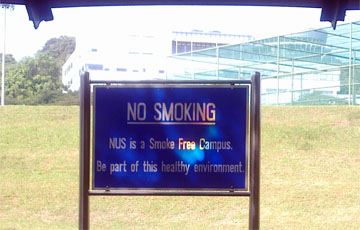 Aw, shucks Some advice from a senior was that smoking is generally more possible for the systems QE, as opposed to the theory one, which I found to be true. As can be seen, the act is not encouraged. As the theory paper went, I felt I did alright for algorithms, despite forgetting the parenthesis-matching method in linear time for finding the maximum number of overlapping intervals (to make it worse, I think a version came out all the way back in CS1102 all those years ago), which goes to show that no matter how much time is given, I could always use more. As algorithms is one of the areas that I enjoyed more, this made me wonder if one likes something because one is ok at it, or one becomes alright at something because one likes it. Probably both. Theory of computation, as usual, had short questions triggering long thought processes. A construct-a-finite-state-machine question came out as 30% of the total, which would generally be good news, since they are often relatively simple. This one however came out of left field: "Construct a deterministic finite automaton which accepts exactly n(n-1)(n-2)/6 + n(n-1)/2 + 1 many members of {0,1}^n for every n". (N.B. The past year papers are publicly available, so I take the liberty of reproducing the question here) I was stumped for a good while - intuitively, I thought, how could a finite number of states encompass any number n? - until I realised that such an FSM might actually be constructed by observing the growth pattern of the formula given, and it does not even need to have all that many states (hopefully I did understand it correctly). This was probably the first of this class of question I had encountered, so I suppose I got lucky there. As for Logic and AI, I must embarrassingly admit that it gave me the most cause for concern out of all the six QE questions I attempted, not the least because I had neglected to revise Hoare logic, and it wasn't even mentioned in the textbook I had (oops). This meant that I had to try and infer how Hoare logic worked from the given questions, which was not exactly fun. Well, well. There was then a week's break before the systems paper, which ended up a breeze compared to theory, which was surprising since I consider myself slightly more of a theory guy. (Then again, as tpk noted, this might mean that I didn't know that I didn't know the subject...)  Wikipedia - the authority Unwilling to repeat the Hoare fiasco, I belatedly discovered that I had sold off all my textbooks relating to systems topics. I had to think quickly - where could I get my hands on a comprehensive overview of each of the subtopics, each not too long, yet containing all the essentials? The answer: Wikipedia. In fact, in my research on the past year questions, it was one of my most referred-to sources, bolstered by the occasional academic website or research paper. Yes, Wikipedia may not exactly have the cachet of Knuth, but I've found it to be reliable enough. It was then straightforward to collate all the relevant Wikipedia pages into a single PDF file with PDFCreator, which turned out to be an average of 200-plus pages per subject, or near a thousand pages for all four subjects (which would make a fair-sized textbook). However, by printing eight to a page, double-sided, one can get a relatively compact representation of the matter. Every once in a while, it helps to remember that the stuff that one learns can actually apply to other fields too. Take token passing in networks for instance. Extract from The Straits Times: "A KTM railway station master prepares to hand over a brass token to an oncoming train driver. The driver will hook his arm through the hoop as he passes slowly. The token, kept in a leather pouch, confirms to the driver that his is the only train on that section of track at any time and that he is cleared to proceed." 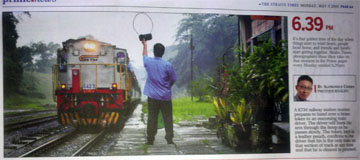 Token of appreciation What is more, this photo actually drew a forum letter from the Prime Minister himself, who said that "...after more than 50 years, I discover that it actually contains a brass token, and is a safety measure to ensure that the train with the token is the only one on that two-way section of track!". Live and learn, I suppose. More testy events surfaced in the forum, with the PM soon to address the issue of the weightage of mother tongue in the PSLE. First questions first: Cui bono? The answer appears obvious: Students who are relatively stronger in the other subjects relative to their mother tongue will benefit (assuming that the weightage taken from the mother tongue component is distributed evenly), and vice versa. This is if one views the PSLE as a zero-sum game, the main objective of which is to gain admittance to a good secondary school (and with through-train programmes being so popular nowadays, maybe even a good JC), since the number of vacancies in each school is fixed. As with many such changes, it is often that the positives are emphasized, and any negatives downplayed (e.g. by showcasing a student who had been doing very badly in his mother tongue but is now saved, while not giving any attention to the student who had excelled in his mother tongue, but just above average in his other subjects, and thus has his dreams of entering a top school dashed). As if on cue, a forum letter questioned the "odd approach" of taking a "defeatist" stance towards "equipping (students) with the necessary soft and hard skills", which is "contrary to the values of resilience and tenacity the education system is trying to inculcate in the first place", and then urges readers to think about pupils from Chinese-speaking families. Cui bono indeed. The writer then argues that "...our education system prides itself on meritocracy, and reducing the weighting of mother tongue will undoubtedly go against this spirit". Does it really? In the sense that our current weightage of subjects is "fairer", then perhaps. However, one could argue for any number of components; for example, isn't aesthetics important? Should arts and craft not then contribute a nominal weightage, say 10 of the 300 points? Health might contribute more to quality of life than any other subject, and Singapore just got named as the world's number two Sports City (I have absolutely no idea how that happened) so why not grade P.E. too? Here, some parents might complain that their kids might not have physically matured yet, but come to think of it, don't kids mature mentally at different rates too? Cui bono. The second question is whether this is a race to the bottom; since previous batches of students have more or less survived the syllabus somehow (despite protestations from those who hated mother tongue and had it drag them back), why "solve" the problem by making things easier (then again, it's been happening for some time in National Service)? This can probably be answered from the perspective of utility - children may be made to learn any number of things, and the process of learning surely builds resilience, tenacity, discipline, perseverance and any number of positive adjectives. Back to the arts, it is completely possible to focus a child on, say, drawing realistic portraits, and if the child goes about it diligently, he will pick up those values. The trouble is that, art in general is not especially monetizable (yes, yes, if you're Picasso you can scratch out an abstract painting of your naked mistress in a day and have it sell for a hundred million dollars, but firstly, for every Picasso there is a veritable legion of starving artists [key example: Hitler], and secondly, it is not uncommon for an artist's works to sell for lots of money only after he is dead)  You are Picasso and I claim my many million dollars The point to be made is: Any number of subjects can inculcate good values, with the right attitude; so, the main determinant of what subjects to select for compulsory education would be how useful they are. English is undoubtedly the lingua franca of the world, the sciences are the bedrock of development, and mathematics is the queen of the sciences (taking the title from theology, which held it in the Middle Ages), and overall very nice to know whenever money is concerned. Could a student gifted in English, Mathematics and Science do well in this society? Almost certainly, other things being equal. What about Chinese, Mathematics and Science? Why not? Heck, if it comes down to that, one could fail all four subjects and possibly still do well in life - it is just a matter of probability. Having a good command of at least one language should be critical, but which one? Frankly speaking, English is probably more portable, which might be deduced from the fact that all other non-language subjects are taught in English, which is a consequence of it being the language of scholarship (students could thank their lucky stars they no longer need to learn Latin). It is however no secret that the mother tongue policy was introduced, at least in part, with an eye on China (and perhaps India etc), with bilingual citizens conversant in both tongues having an advantage in doing business in those rising cultures. Then again, as somebody wrote, it might be more likely that the Chinese and Indians would be talking in English. Shanghaiese schools dedicate 2500 hours a year to English, for instance, which is a whole lot when one considers that there are only 8760 hours in a year. My verdict? Each side chooses a champion, and they duel in a no-holds-barred cage match at one of the new IRs. No? Maybe upgrade the Special stream to Absolutely Extraordinary, Express to Supersonic, and Normal (Academic) and Normal (Technical) to Very Good (Academic) and Even Better (Technical). Alright, being serious, my personal opinion is that the kids should simply get on with it and quit whining, but that's just me; when a relative measure is chosen, not everybody can "win" - it should be a theorem or something.
|
|||||||||||||||||||||||||
 Copyright © 2006-2025 GLYS. All Rights Reserved. |
|||||||||||||||||||||||||